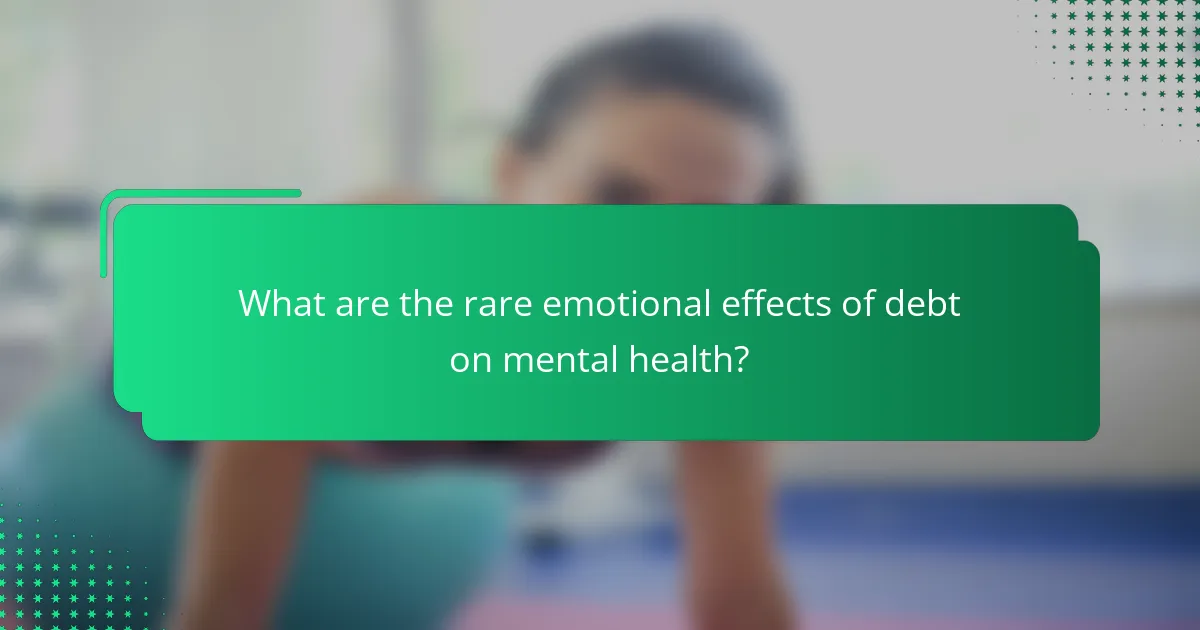Debt can significantly impact mental health, leading to anxiety, depression, and stress. It often results in feelings of shame and isolation, affecting relationships and overall well-being. Different types of debt create unique emotional challenges, while rare effects can include guilt and chronic anxiety. Effective management strategies, such as mindfulness and professional support, can help mitigate these emotional burdens.

How does debt impact mental health?
Debt significantly harms mental health, leading to anxiety, depression, and stress. The emotional burden of financial obligations can create a cycle of negative thoughts. Research shows individuals in debt often experience lower self-esteem and increased feelings of shame. Furthermore, the constant worry about finances can disrupt sleep and overall well-being, illustrating the profound emotional effects of debt.
What are the common emotional responses to debt?
Debt often triggers a range of emotional responses that can significantly impact mental health. Common reactions include anxiety, stress, and feelings of hopelessness. These emotions arise from the pressure of financial obligations and the uncertainty of future stability.
Many individuals experience guilt or shame, particularly when they perceive their debt as a personal failure. This can lead to social withdrawal and a decline in self-esteem. Chronic debt can also result in depression, as individuals feel trapped in their financial situation, impacting their overall well-being.
As a result, addressing the emotional effects of debt is crucial for mental health. Seeking support, whether through counseling or community resources, can help individuals cope with these feelings and develop healthier financial habits.
How does financial stress manifest in daily life?
Financial stress often manifests as anxiety, irritability, and difficulty concentrating. Individuals may experience sleep disturbances and changes in appetite. Chronic stress from debt can lead to feelings of isolation and hopelessness. Studies indicate that financial strain significantly correlates with mental health issues, including depression. This emotional toll can affect relationships and overall quality of life, creating a cycle of stress and further financial difficulties.
What are the physical symptoms associated with financial stress?
Financial stress can lead to various physical symptoms. Common manifestations include headaches, fatigue, muscle tension, and digestive issues. These symptoms arise as the body reacts to prolonged anxiety and pressure associated with financial concerns. Research indicates that chronic financial stress can weaken the immune system, making individuals more susceptible to illnesses. Addressing financial stress through proper management strategies can alleviate these physical symptoms and improve overall well-being.
How does financial stress affect relationships?
Financial stress can significantly strain relationships, leading to emotional distress and conflict. Couples facing debt often experience increased anxiety and frustration, which can diminish communication and intimacy. Research indicates that financial issues are a leading cause of relationship breakdowns, with around 70% of couples citing money as a primary source of tension.
The unique attribute of financial stress is its pervasive impact on mental health, manifesting as feelings of inadequacy or shame. These feelings can lead to withdrawal or resentment, further complicating relationship dynamics. As a result, addressing financial concerns collaboratively can foster resilience and strengthen bonds.

What are the universal emotional effects of debt?
Debt universally affects mental health by inducing stress, anxiety, and depression. Individuals often experience feelings of shame and isolation due to financial burdens. Studies show that chronic debt can lead to a decline in overall well-being, impacting relationships and work performance. The unique attribute of debt-related emotional distress is its pervasive nature, affecting various aspects of life and mental health stability. As a result, addressing financial issues can significantly improve emotional health and overall quality of life.
How does debt lead to anxiety and depression?
Debt significantly contributes to anxiety and depression by creating financial stress and uncertainty. Individuals often experience feelings of helplessness and fear regarding their financial future. This emotional burden can lead to a cycle of negative thoughts and increased mental health issues.
Research indicates that high debt levels correlate with increased rates of anxiety disorders and depressive symptoms. For example, a study found that individuals with significant debt are 3.5 times more likely to experience anxiety than those without debt. The constant worry about repayment can disrupt daily life, affecting relationships and overall well-being.
Moreover, the stigma associated with debt can lead to isolation, compounding feelings of depression. People may withdraw from social interactions due to embarrassment, further exacerbating their mental health struggles. Understanding these emotional effects is crucial for addressing mental health in the context of financial challenges.
What role does shame play in the emotional effects of debt?
Shame significantly exacerbates the emotional effects of debt, leading to anxiety and depression. Individuals often feel isolated due to societal stigma, which can hinder their ability to seek help. This emotional turmoil can create a cycle of negative thoughts, further impacting mental health. Research indicates that over 60% of those in debt report feelings of shame, affecting their relationships and overall well-being. Addressing shame is crucial for recovery, as it fosters resilience and encourages open discussions about financial struggles.

What unique emotional challenges arise from specific types of debt?
Certain types of debt can trigger unique emotional challenges, impacting mental health significantly. For instance, student loan debt often leads to anxiety due to the pressure of future job prospects. Medical debt can cause feelings of shame and helplessness, as individuals may feel their health is tied to their financial situation. Credit card debt frequently results in stress and guilt, stemming from overspending and accumulating interest. Each type of debt carries distinct emotional burdens, influencing overall well-being and requiring tailored coping strategies.
How do student loans uniquely affect mental health?
Student loans significantly impact mental health by inducing stress and anxiety. The burden of debt can lead to feelings of inadequacy and hopelessness, especially among young adults. Research indicates that individuals with student loans report higher levels of depression compared to those without debt. The unique attribute of this situation is that many borrowers feel trapped by their financial obligations, which can hinder their ability to pursue career opportunities or personal goals. As a result, the emotional toll of student loans can create long-lasting mental health challenges.
What emotional impact does credit card debt have?
Credit card debt significantly affects mental health, leading to anxiety and depression. The constant worry about payments can create a cycle of stress. Studies indicate individuals with debt experience lower life satisfaction and heightened emotional distress. This emotional burden can disrupt relationships and overall well-being, highlighting the need for effective debt management strategies.

What are the rare emotional effects of debt on mental health?
Debt can lead to rare emotional effects on mental health, including feelings of isolation, guilt, and chronic anxiety. These emotions may stem from the pressure of financial obligations and societal stigma. Individuals may experience unique attributes, such as a diminished sense of self-worth or heightened stress responses. Research shows that these emotional impacts can result in withdrawal from social activities and strained relationships, exacerbating mental health issues. Addressing these rare effects can promote emotional resilience and improve overall well-being.
How can debt lead to feelings of hopelessness?
Debt can lead to feelings of hopelessness due to constant stress and anxiety. The emotional burden of financial obligations often results in a sense of loss of control over one’s life. Individuals may experience increased feelings of isolation, as they withdraw from social interactions to avoid discussing their financial situations. This emotional strain can contribute to mental health issues like depression and anxiety disorders. Studies show that individuals with significant debt are more likely to report feelings of despair and hopelessness, highlighting a unique link between financial stress and emotional well-being.
What is the relationship between debt and suicidal ideation?
Debt significantly increases the risk of suicidal ideation due to its emotional and psychological toll. Financial strain can lead to feelings of hopelessness, anxiety, and depression, which are closely linked to suicidal thoughts. Studies indicate that individuals with unmanageable debt are more likely to experience mental health issues, creating a vicious cycle. Addressing financial problems through support and resources can mitigate these mental health risks and improve overall well-being.

What strategies can help manage the emotional effects of debt?
To manage the emotional effects of debt, individuals can adopt several effective strategies. Practicing mindfulness helps reduce anxiety and promotes emotional regulation. Seeking professional support, such as therapy or financial counseling, can provide valuable coping tools. Establishing a budget fosters a sense of control, while setting achievable financial goals can motivate positive change. Connecting with supportive friends or family members can alleviate feelings of isolation. Engaging in regular physical activity enhances overall well-being and reduces stress levels.
How can financial literacy improve mental health outcomes?
Financial literacy can significantly enhance mental health outcomes by reducing the emotional effects of debt. Understanding financial concepts helps individuals manage their resources effectively, leading to decreased anxiety and stress. Improved financial literacy equips people with skills to budget, save, and invest, fostering a sense of control over their financial situation. As a result, individuals experience lower rates of depression and improved overall well-being. Studies indicate that individuals with higher financial literacy report better mental health, highlighting the importance of financial education in promoting emotional stability.
What support systems are effective for those struggling with debt?
Support systems that effectively aid those struggling with debt include counseling services, support groups, financial education programs, and peer support networks. These systems provide emotional reassurance and practical strategies to manage financial stress.
Counseling services offer professional guidance, helping individuals explore their feelings about debt and develop coping mechanisms. Support groups create a community where individuals can share experiences and gain insights from others facing similar challenges.
Financial education programs empower individuals with knowledge about budgeting, saving, and debt management. Peer support networks foster a sense of belonging, reducing feelings of isolation and anxiety tied to financial struggles.
Combining these support systems can significantly improve mental health outcomes for those dealing with debt.
What are the best practices for coping with debt-related stress?
To cope with debt-related stress, focus on practical strategies that enhance emotional resilience. Prioritize creating a budget to manage finances effectively. Seek support from friends or professionals to share your feelings. Engage in mindfulness practices, such as meditation or yoga, to reduce anxiety. Establish realistic goals to regain control over your financial situation. Celebrate small achievements to boost motivation and maintain a positive outlook.
How can individuals avoid common pitfalls in managing debt-related emotions?
Individuals can avoid common pitfalls in managing debt-related emotions by practicing proactive coping strategies. Recognizing emotional triggers is crucial; awareness helps in addressing feelings of anxiety or shame. Establishing a support system, including friends or financial advisors, can provide guidance and reassurance. Setting realistic financial goals fosters a sense of control and accomplishment, reducing negative emotions. Additionally, engaging in stress-reducing activities, such as exercise or mindfulness, can improve mental well-being. Regularly reviewing financial situations can empower individuals to make informed decisions, alleviating feelings of helplessness.


